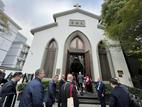At the end of each year, Pastor Zhu's church carefully reviews its financial records—and then clears all remaining funds. "No matter there's a few hundred thousand left, we don't keep a cent. It all goes toward missions," Pastor Zhu said. "This is a practice we've faithfully maintained over the years."
Pastor Zhu is an ordinary pastor serving in an ordinary city in northern China for almost 20 years, but his church is anything but ordinary. By clearing its finances at the end of every year, the church challenges the fear of the future, confronts the very purpose of church existence, and walks a seemingly "risky" path of faith, experiencing unexpected breakthroughs and divine provision along the way.
Starting each year with a zero balance is no small challenge. "Ordinary people can save money, but the church shouldn't," Zhu said. "Most church problems are related to money. Even if we manage to save a few hundred thousand or even a million, that money may not stay with the church in the end."
This approach is especially rare in Chinese churches, given the deeply ingrained cultural habit of saving. Shaped by centuries of wars, floods, and famines, Chinese people have developed a strong instinct to prepare for hard times. Historical records show that the Yellow River overflowed 1,593 times in 2,000 years, large-scale wars occurred over 3,800 times, and more than 1,000 famines were recorded during the Ming and Qing dynasties.
"Chinese people—and Chinese communities around the world—tend to hold tightly to their money. Even after becoming Christians, many still think this way," Zhu said. "That may be understandable before coming to faith. But after believing in God, we're called to live by faith. And faith isn't just an idea—it needs to be lived out in real, concrete ways."
When Zhu first arrived at the church, it was in deep trouble. After many difficulties, the church couldn't pay its full-time staff for three consecutive months or even afford rent.
Zhu's response was counterintuitive: the more the church struggled, the more it gave. He firmly believed, "It is more blessed to give than to receive." At first, fellow staff members didn't understand. But after Zhu patiently explained his reasoning, they agreed to the plan.
So, even in great difficulty, the church began to support other churches, giving away people, money, and nearly everything they had.
Then came the miracle. As they gave more, they experienced greater joy. God's blessings and provision grew. Former members returned, bringing new believers with them. Monthly offerings increased significantly. Most importantly, the morale of the congregation was renewed.
Zhu demonstrated leadership by example. While working to raise enough to pay three months of back wages to staff, he and his wife—both full-time workers—didn't take a penny for themselves during that period.
"In my eyes, God is not stingy or tight-fisted. On the contrary, He is incredibly generous. What He gives us is often more than we can imagine or ask for," Zhu said. "When we face needs, it's not that God isn't providing—it may be that He's testing our faith. If our faith is in place, everything else will follow."
In one instance, the church planned to launch a new ministry project, which needed 30,000 yuan to initiate and another 30,000 to 40,000 yuan (around 4200 to 5600 US dollars) to run. At the time, the church had no extra funds—it was already struggling to pay rent and salaries. But after weeks of prayer, the vision was confirmed, and the church stepped forward in faith. Less than a month later, every financial need for the new ministry was miraculously met.
"This showed us that God had already prepared everything before we even started," Zhu said. "It was in our most difficult moments, when we chose to begin new ministries, that we experienced the greatest breakthroughs."
Over the years, the church has had many such stories. Faith has grown deeply among both leaders and members. When Pastor Zhu first proposed the radical idea of financial clearing, no one opposed it. They were convinced that no matter what, God would make a way. They had built a firm trust in God, and He did not disappoint them, pouring out grace upon grace.
As the church consistently practiced year-end financial clearing, its annual income kept growing. God's provision exceeded all expectations. Even during the pandemic and the challenging years that followed—when many faced unemployment and economic downturn—the church continued to grow steadily in every aspect: membership, staff, and financial giving.
This church demonstrated that many believers are willing to give generously, but sometimes, a stagnant church with little vision or activity stifles that willingness. When the church is growing, faith and generosity both flourish.
"I believe if we are truly doing God's work," Pastor Zhu said, "God will never let us pay out of our own pockets."
Originally published by the Christian Times
- Edited and translated by Katherine Guo












